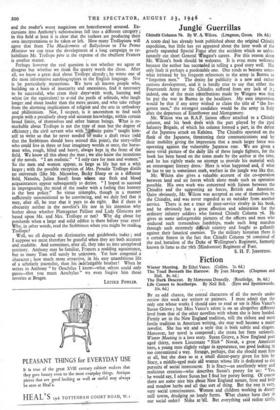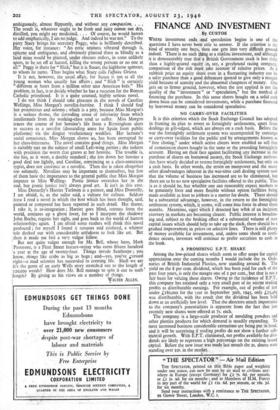Fiction
Winter Meeting. By Ethel Vance. (Collins. 7s. 6d.)
BY an odd chance, the central characters of all the novels under review this week are writers or painters. I must admit that the only one whose works I should care to read or see is Miss Vance's Susan Grieve ; but Miss Vance's talent is on an altogether different level from that of the other novelists with whom she is here herded. Firmly set in the New England tradition, still the richest and most fertile tradition in American writing, she may well become a major novelist. She has wit and a style that is both subtle and elegant. Moreover, her novel is composed ; she treats her form seriously. Winter Meeting is a love story. Susan Grieve, a New England poet aged thirty, meets Lieutenant " Slick " Novak, a great American hero, a young man slightly vulgar in appearance, too good looking in too conventional a way. Strange, perhaps, that she should meet him at all, but she does so at a small dinner-party given for him by Stacy, a middle-aged male old woman whose life is dedicated to the pursuits of social intercourse. It is Stacy—an excellently witty and malicious creation—who describes Susan's poetry for us: " Yes, he would say, I adore Susan but I find her poetry boring. Of course there are some nice bits about New England nature, frost and kelp and meadow herbs and all that sort of thing. But the rest is very, very social consciousness. Women and children working in dreary mill towns, drudging on lonely farms. What chance have they in our social order? Mine at Pall. But everything said rather tartly, ambiguously, almost flippantly, and without any compassion.. . . The result is, whatever ought to be fresh and juicy comes out dry, distilled, you might say medicinal. . . . Of course, he would hasten to add emphatically, I am no judge. And indeed he was not." To the piny Stay brings his secretary Peggy, who is brilliantly described. Her voice for instance: "An eerie sexiness vibrated through it, epicene and ambiguous, and obviously planted there as blindly as a laud mine would be planted, under obscure orders, in some unlikely spots, to beset off at hazard, killing the wrong persons or no one at all." Peggy is there for "Slick," but it is Susan, the highbrow spinster, to "whom he nuns. Thus begins what Stacy calls l'affaire Grieve.
It is not, however, the usual affair, for Susan is not at all the young woman Who usually has affairs ; and " Slick " is certainly " different at heart from a mfflion other nice American kids." His problem, in fact, is to decide whether he has a vocation for the Roman Catholic priesthood. It is a quite unusual, highly serious novel.
I -do not think I should take pleasure in the novels of Caroline Wellings, Miss Morgan',s novelist-hereine. I think I should find her pretentious and solemn ; which is a pity, because Miss Morgan's is a serious theme, the Corroding sense of inferiority from which intellectuals from ate working-class tend to suffer. Miss Morgan traces the course of her heroine's life from a Birmingham slum to success as a novelist (demanding arms for Spain from public platforms) via the dingier -evolutionary weeklies. Her heroine's social conscience, Miss Morgan shows us, has been corrupted by her class-bitterness. The novel contains good things. Miss Morgan is suitably tart on the subject of small Left-wing parties ; she isolates with precision the worm that gnaws at her heroine. The trouble is, she has, as it were, a double standard ; she lets down her heroine a good deal too lightly, and Caroline, convincing as a class-conscious typist, does not convince as a novelist. Then she is taken altogether too solemnly. Novelists may be important to themselves, but few of them have the importance to the general public that Miss Morgan imputes to Miss Welling:. Poetic justice overtakes her in the end, but poetic justice isn't always good art. It isn't in this case. Miss Donnelly's Harriet Tarleton is a painter, and Miss Donnelly, I am afraid, is, as the sailor said, a vulture for culture. Seldom have I read a novel in which the best which has been thought, said, painted or composed has been reported in such detail. Her theme, I take it, is re-integration ; Harriet goes blind, retreats from the world, conjures up a ghost lover, for so I interpret the shadowy John Roche, regains her sight, and goes back to the world of human relationships again. I am afraid some readers will think this novel profound; myself I found it tenuous and etiolated, a whimsy tale decke out with considerable artfulness to look like art. But then it made me feel a very vulgar, fellow. But not quite vulgar enough for Mr. Bell, whose hero, Mark Passmore, is a Fleet Street feature-writer who earns fifteen hundred 'a year at the age of twenty-four. things invade Seathorpe ; you • know, things like orabs as big as hogs ; and—yes, you've ;messed right—a mad scientist has succeeded in creating life. Shall we say it's the germ of an early Wells story stretched out to the length of 120;000 words? How does Mr. Bell manage to spin it out to such length? By giving us his views on a number of things.
WALTER ALLEN.



























 Previous page
Previous page